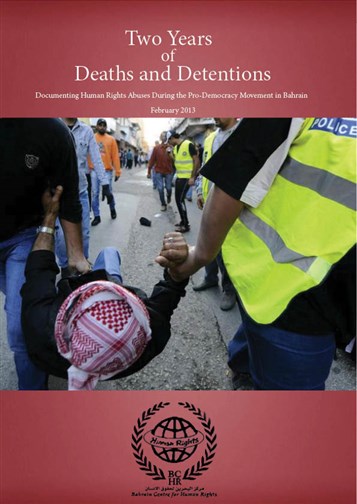The Bahrain Center for Human Rights publishes a second anniversary report: "Two Years of Deaths and Detentions: Documenting Human Rights Abuses During the Pro-Democracy Movement in Bahrain (February 2013)"
An Opening Letter From Maryam Al-Khawaja:
In the two years that the pro-democracy movement has been ongoing, eighty-seven people have died as a direct result of the excessive use of force applied by the King’s brutal security forces, including thirteen children under the age of eighteen. As this report details the deaths and detentions that dominate the government’s appalling repression of democracy, the Bahrain Center for Human Rights asks how long will the West continue to support these atrocities?
The first months of the government’s crackdown were some of the most violent of all the pro-democracy movements in the Middle East region. Police officers killed peaceful protesters without the fear of consequences. In secretive, military trials, pro-democracy activists and human rights defenders were sentenced to lengthy prison terms, including up to life in prison, or even death. The retrials in civilian court do not follow due process, and merely represent the government’s wish to present a softer image of itself to the world. The situation on the ground has not improved.
Masked men in civilian clothing regularly kick down the doors to civilian homes in the middle of the night, firing tear gas inside and harassing anyone they suspect of participating in the pro-democracy movement. People are kidnapped by security officers during such raids as well as from public places, often reappearing only after several days and with grotesque signs of torture marking their body.
My father recently began another hunger strike, along with other members of the “Bahraini 13,” to protest the unjust conditions he and his fellow prisoners are being subjected to. Hunger strikes are becoming increasingly common in Bahrain as a desperate cry for help from prisoners who have no other options. Political detainees are routinely beaten, verbally abused, held in solitary confinement or with inmates who do not share a common language. The mistreatment is compounded by the cramped and unsanitary conditions in which the prisoners are held.
This report aims to document the way in which King Hamid bin Al-Khalifa’s government has attempted to muzzle the pro-democracy movement in Bahrain with a crackdown that has left a trail of deaths and unjust detentions over the last two years. These pages document the way in which an excessive use of force has led to eighty-seven deaths at the hands of the authorities, and how the death toll continues to rise. The prisons in Bahrain are filled with political prisoners, and prisoners of conscience, and the systematic abuses they receive.
But even in the face of such brutal repression from the government, there is still reason to hope. I recently traveled to Bahrain for the first time in more than a year and a half, and was deeply moved by the peaceful resilience that I witnessed in activists and ordinary citizens across the country. After two years of attacks, the majority of people in Bahrain only want peace, but they will not compromise and allow for their human rights to be trampled upon.
Maryam Al-Khawaja
Acting-President
Bahrain Center for Human Rights







